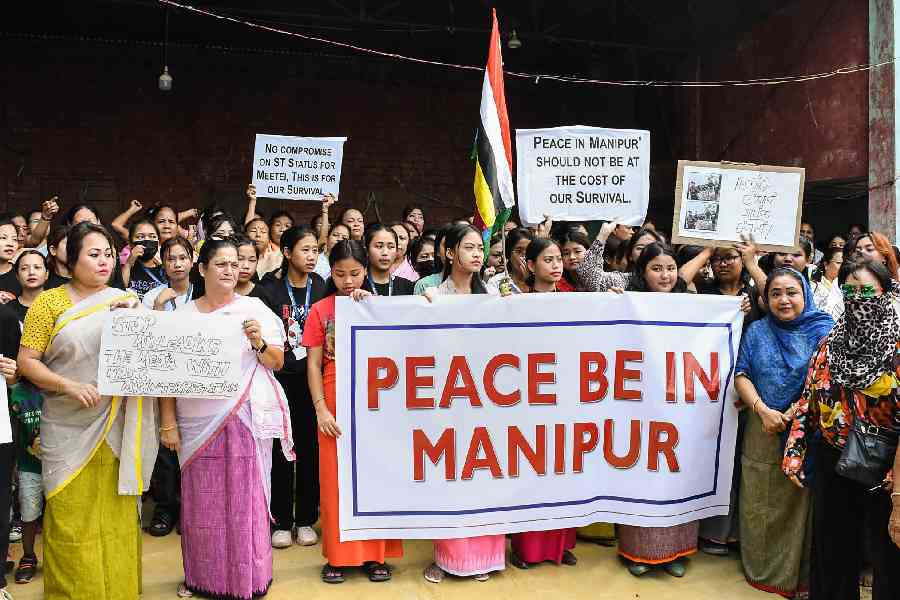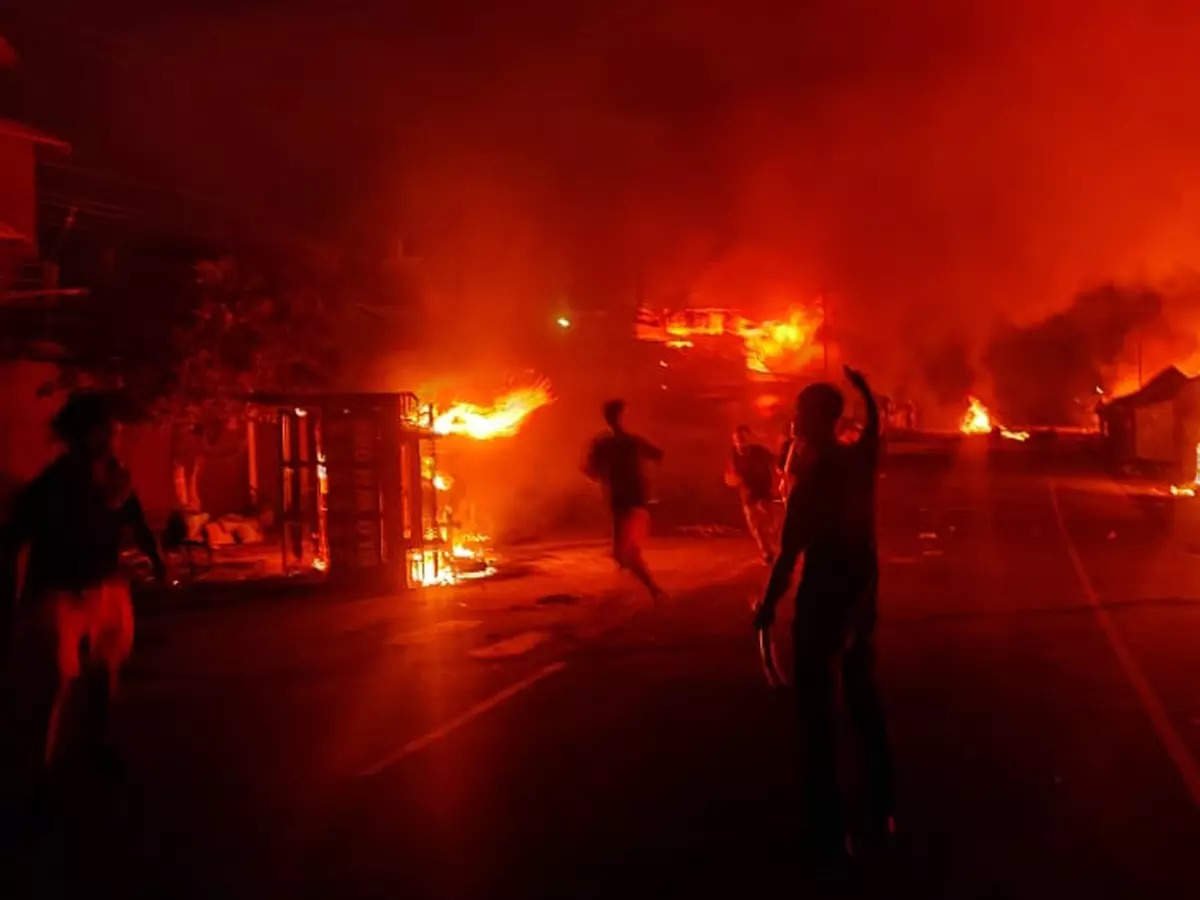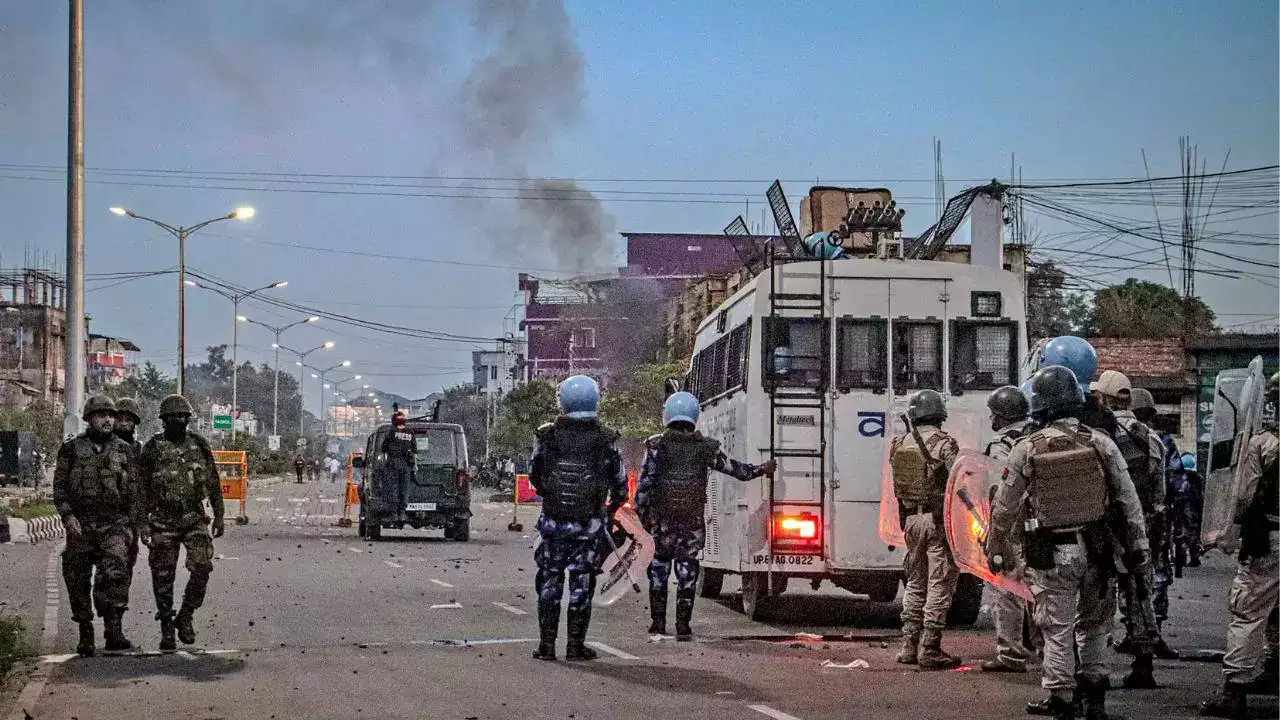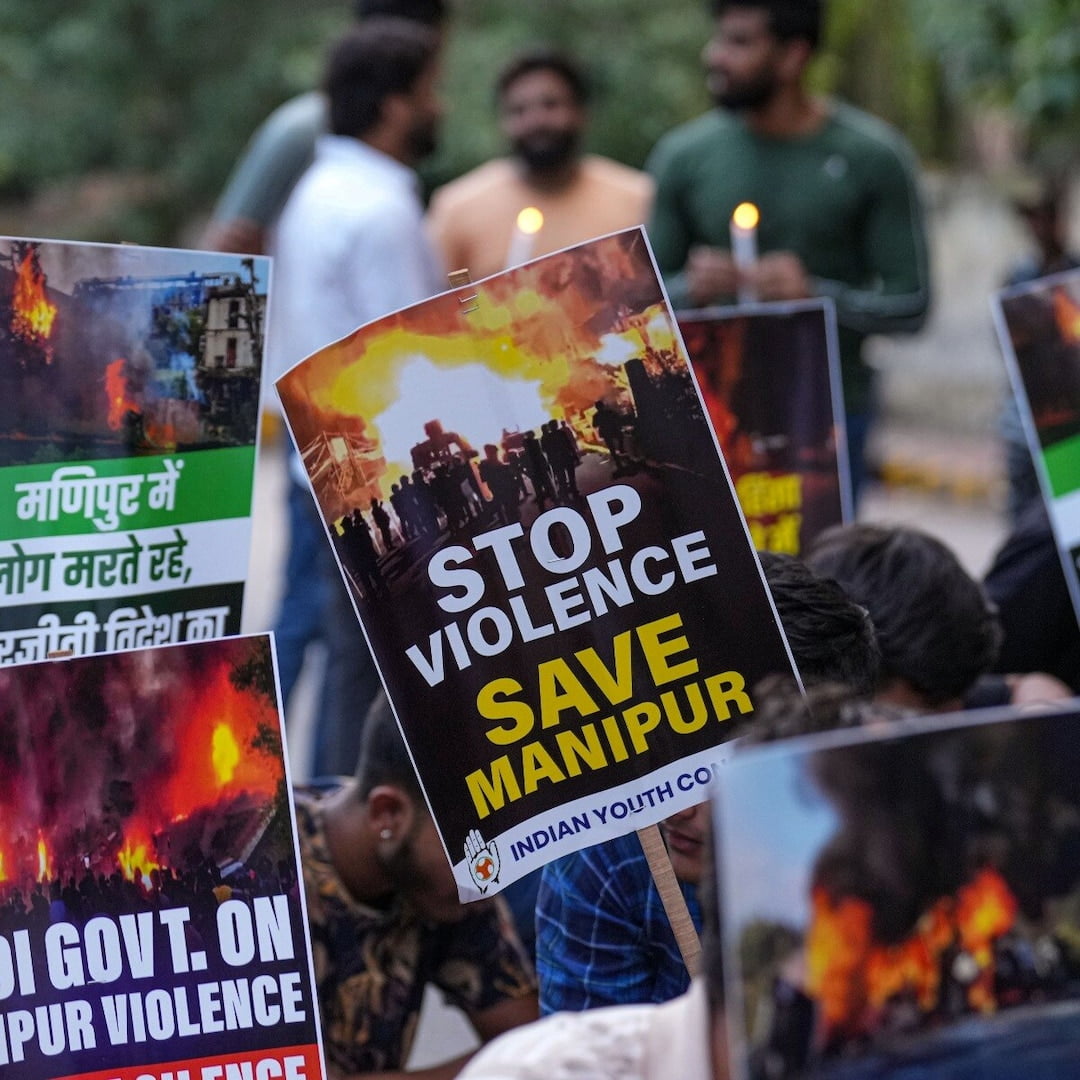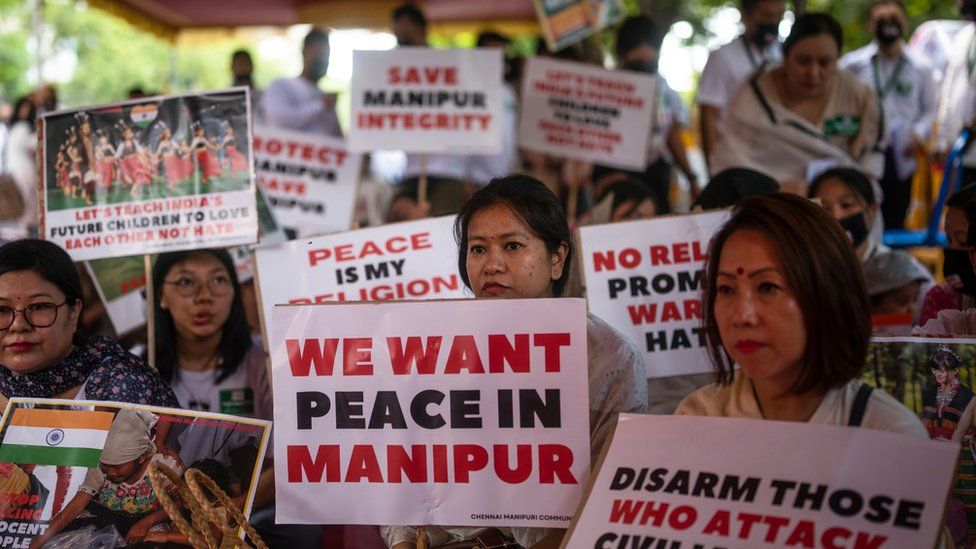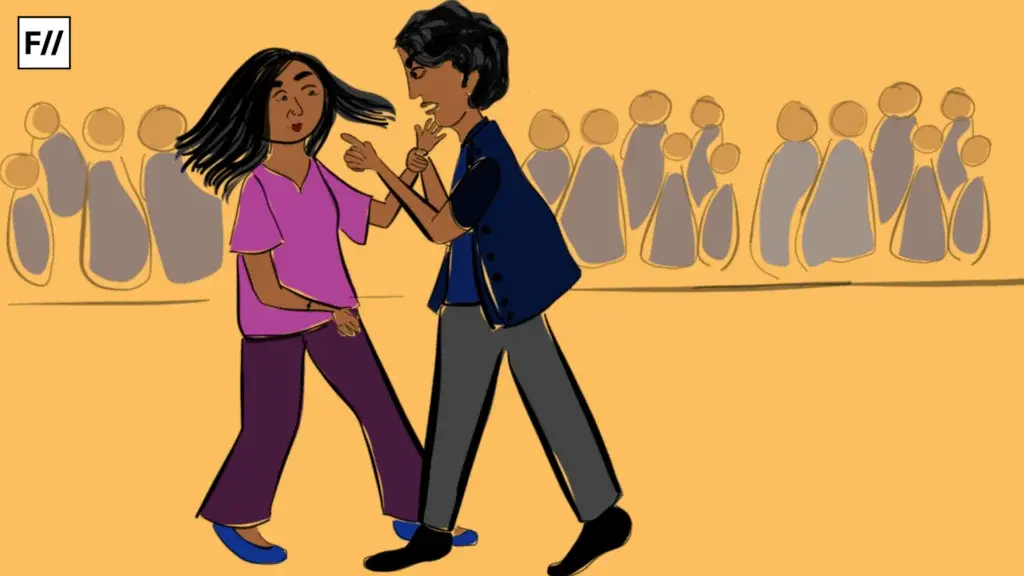Manipur has plunged into yet another cycle of turmoil and violence. In a new turn in the deadly conflict, militant groups have reportedly targeted the civilian population using hi-tech drone technology and rockets. The fresh spate of violence erupted on September 1, when suspected militants used the drones to bomb two Meitei-dominated villages in West Imphal district, killing two villagers and leaving several wounded. Within 48 hours, at least 50 bombs were dropped on different civilian populations, Meitei groups claimed as per the media reports.
Within 48 hours, at least 50 bombs were dropped on different civilian populations, Meitei groups claimed as per the media reports.
Violence resurfaced in the restive state after a pause of four-months between two warring ethnic communities. On September 7 in Sekmai, armed groups attacked a Central Police Reserve Force camp and nearby homes, killing a woman. On September 10, the Manipur state government imposed a curfew in three districts and suspended the internet in five districts until September 15.
Manipur has witnessed a vicious cycle of ethnic violence since May 2023 and the situation in the border state has been catastrophic for more than a year, with communal clashes breaking out regularly. More than 60,000 people have been forced to move in a helpless attempt to save their lives. A significant number of people overnight became refugees in their own state and are now forced to live in cramped shelters. Over 200 people have been killed and scores injured. Hundreds of tribal women became target of frenzy mobs and were raped and sexually abused by angry mobs.
A video surfaced in July 2023 where two Kuki women were paraded naked and were raped. Properties, villages, and homes were burnt on a large scale across the state.
The inflamed situation turned violent on May 3 last year when tribal communities staged a protest against a Manipur High Court order which asked the government to consider granting the majority Meitei community the tribal status. An atmosphere of fear and suspicion spread like a wildfire and ignited a chain of events which eventually turned bloody. The fear among the Kuki-Zo communities that government intend to take away their land and encroach on their benefits has suddenly become real for the hill tribal communities.
Kuki-Zo and other tribal communities in Manipur live primarily in hill areas where the order now opened the doors for the Meiteis to purchase land. Clashes between Meitei and Kuki-Zo broke out after the massive protests and has not seen an end since. Manipur High Court revoked the contentious order in February 2024.
As the conflict has ripped the communities divided and wounded, Manipur has split into two different states – One for Kukis and another for Meiteis. Even the chief Minister of the State cannot visit the fiercely guarded and armed hill areas. Almost all of the Kuki-Zos fled from Imphal Valley, and nearly all Meiteis in the Kuki-majority areas – Churachandpur and Kangpokpi districts – had to move to Meitei dominated valley.
Almost all of the Kuki-Zos fled from Imphal Valley, and nearly all Meiteis in the Kuki-majority areas – Churachandpur and Kangpokpi districts – had to move to Meitei dominated valley.
Since the troubles started, a communal divide in Manipur, comparable to one seen during the Partition, has come into place. Much to the disdain of a hapless state struggling to save its last shreds of legitimacy, ethnic borders and buffer zones have sprung up in Manipur especially in the areas where the Meitei-dominant valley meets the Kuki-inhabited foothills. Firing across the buffer zones ocurs regularly, threatening the lives of the locals who comes under the fire.
The brutalities of this conflict are chilling testimony of the tragic fact that whenever violence takes places between communities, rape and violence against women becomes the primary weapon which is waged by those implicated in the crimes. Sexual violence has been weaponised in this ethnic conflict too.
A long history of armed insurgency and ethnic conflict in Manipur
This current spate of violence is a renewed fight in a long-standing ethnic conflict between two dominant communities within the state, the Kukis and the Meities. Ethnic disputes over land, natural resources, and legal recognition contained the seeds of turning deadly for decades. The northeastern state has witnessed violence for almost six decades in two different forms – one is the secessionist insurgency against the Indian state, and another one is the ethnic conflict between communities. The armed insurgencies against the Indian state have made both the militant groups and central armed security forces to commit horrific violations of human rights.
The trigger for the current deadlock may have been the recent political developments, the constant build-up of tension, hate and mistrust was taking place for quite some time. The state government’s patronising attitude towards certain interests and selective approach further alienised the grieved communities.
Rights over land, recognition for legal benefits and illegal immigration are the focal points of this conflict. The minority Kuki-Zo community accuses the authorities of racial discrimination and waging an ethnic warfare through the forced eviction of villagers from forest areas. The Meiteis fear the illegal immigration from nearby Myanmar and high population growth rate of 24.5% in Manipur while the Kuki-Zo deny such claims of immigration. Protests are held by the Meitei groups demanding to implement the National Register of Citizens (NRC) to recognise all illegal immigrants in the state.
Kuki-Zo communities have accused that the state BJP government has its political backing for the violent vigilante groups of the Meitei community which have engaged in attacks and sexual violence against the minorities. Manipur authorities have been unable to investigate against groups implicated in violence.
Total collapse of state authority in Manipur
After an year of the bloodbath in the border state, in July 2024 Prime Minister Narendra Modi broke his silence on the issue in Parliament when he claimed that the Centre’s timely intervention in the matter along with the efforts made by the state government have led to a ‘marked improvement in the situation‘ in Manipur. Ground realities seem to differ altogether from the accounts of the power corridors of Delhi.
The cycle of violence and ethnic clashes started in Manipur last year and has not stopped ever since despite the Government claims of control over the situation and its improvement.
The cycle of violence and ethnic clashes started in Manipur last year and has not stopped ever since despite the Government claims of control over the situation and its improvement. It has also brought to fore the inability of Indian state to establish law and order in a conflict ridden state. In absence of a capable state to redress the situation, an apparent anarchy has taken Manipur into its grip and the border state has become a fertile ground for ethnic cleansing.
It has showed that the Indian state has serious weaknesses when it comes to resolve the sensitive armed conflicts in its interior parts. The State seems completely incapacitated and has not been able to act in a manner which is effective and concrete. For more than year the central government has abdicated in its responsibilities and shown no signs of implementing what a State must do in the strife-torn situation like this.
Manipuri society is highly militarised at this juncture and armed on disproportionate levels. Seeing the volatility of the situation, the danger is that the such situation can explode into a bigger catastrophe and widespread civilian armament may cause an unseen bloodbath. The recuring rounds of violence are only providing for further militarisation.
‘Things are far from normal in Manipur. One thing which was always starkly evident, and has not changed, is the absence of the authority of the state — both the provincial state of Manipur and the Indian state — in this conflict theatre, leaving it up to people to fend for themselves,‘ said Pradip Phanjoubam, editor of the Imphal Review of Arts and Politics web journal.
De-escalation and political engagement is the need of the hour
De-escalation of the situation in Manipur must be the priority of public, civil society, local media and most importantly the government. A state is on fire for more than a year and the government is unable to diffuse the tension and resolve the explosive situation is a crisis of credibility and governance. The Prime Minister could not find the time to visit the violence affected state for even a once. The Union government has showed a neglect and callousness towards the wounds of Manipur’s people and even a dangerous indifference in making efforts towards that aim.
However, the ignorance is nothing new as the Modi-led BJP government is known for its shaky responses to difficult scenarios, denial of people’s grievances and covering up almost every challenge that comes in its way as was seen during the CAA- NRC protests and Farmers’ protests.
The central government should prioritise the stopping of the killings of people and put an end to the civil war like situation between the two ethnic groups.
The central government should prioritise the stopping of the killings of people and put an end to the civil war like situation between the two ethnic groups. Both the Manipur state and central governments should take prompt measures to resolve disputes, investigate abuses, and appropriately punish those responsible. The Biren Singh government has also on its hands an uphill task of redressal for victims of abuses, sexual violence.
A fair investigation and then prompt prosecution should be carried out. Demobilising and disarming armed groups is essential for returning to a time of peace and sanity. The crisis in Manipur can only be resolved through political engagement of government and all communities.
